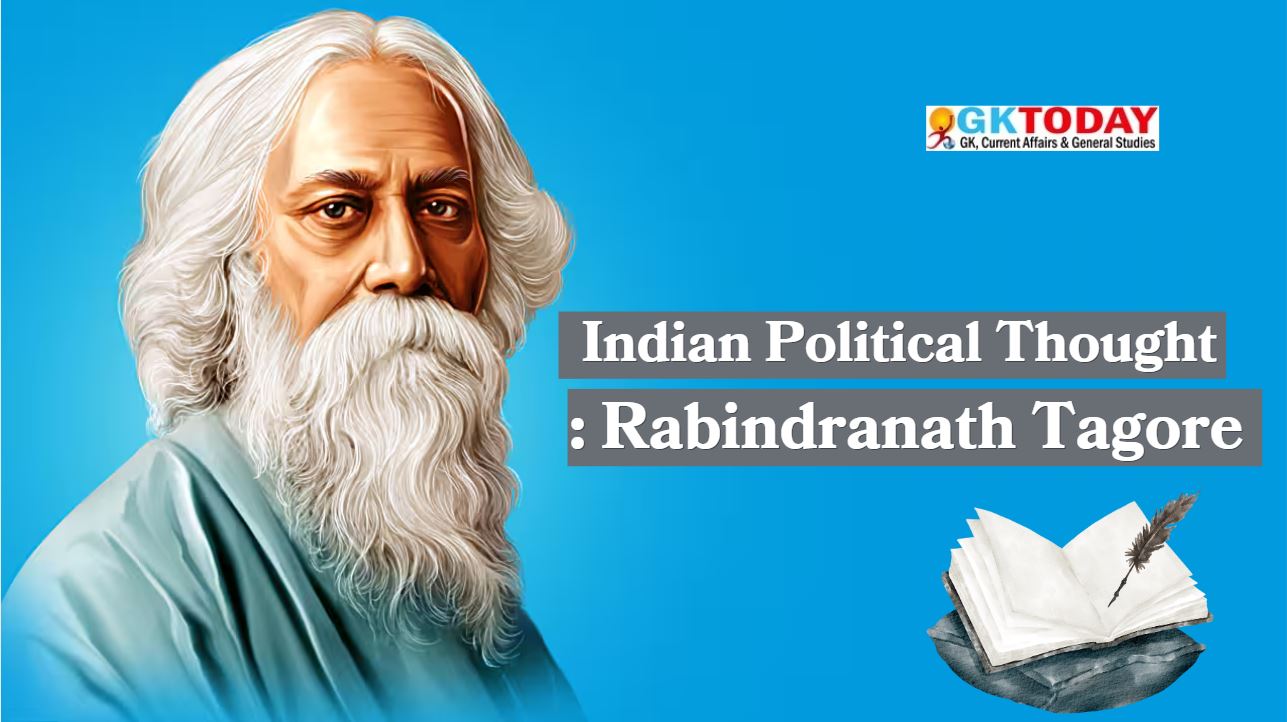Indian Political Thought: Rabindranath Tagore
Rabindranath Tagore was a multifaceted thinker whose contributions spanned literature, philosophy, and education. He was a very important figure in Indian political thought, advocating for universalism and cultural identity. His works and ideas continue to resonate, influencing various movements and thinkers across the globe.
Biographical Overview
Rabindranath Tagore was born on May 7, 1861, in Kolkata. He belonged to the illustrious Tagore family, known for its involvement in arts and education. Tagore received his education at the University of Calcutta and briefly studied at London University. He passed away on August 7, 1941.
Literary Contributions
Tagore was the first non-European to receive the Nobel Prize in Literature in 1913. His notable works include:
- “Gitanjali” (Song Offerings) – A collection of poems reflecting his spiritual and philosophical thoughts.
- “The Home and the World” – A novel that explores themes of nationalism and personal relationships.
- “Kabuliwala” – A short story that delves into cultural and emotional connections.
He also wrote plays, including “The Post Office” and “Chitra”, which showcase his literary prowess.
Philosophical Ideas
Tagore’s philosophy centred around several key concepts:
- Universalism – He emphasised the interconnectedness of humanity, transcending national boundaries.
- Harmony – He believed in the unity of the individual with the universe.
- Spiritual Approach – Tagore advocated for a life enriched by art, culture, and philosophy.
His ideas encourage a holistic understanding of existence.
Political Views
Tagore was vocal about his political beliefs:
- Critique of Nationalism – He warned against extreme nationalism, advocating for inclusivity.
- Views on Colonialism – He critiqued British colonial rule, supporting self-governance and cultural revival.
- Support for Independence – While opposing violent methods, he endorsed the concept of self-rule.
Tagore’s insights were crucial during India’s struggle for independence.
Educational Philosophy
In 1921, Tagore founded Visva-Bharati University in Santiniketan. His educational philosophy included:
- Holistic Education – He advocated for nurturing creativity and individuality.
- Nature and Arts – Emphasised the importance of nature and artistic expression in learning.
His approach aimed to integrate Eastern and Western philosophies.
Cultural Contributions
Tagore played role in promoting Bengali culture:
- Literary Promotion – He championed Bengali literature through his writings.
- Indian Renaissance – His work influenced the broader cultural movement in India.
- Integration of Arts – He worked towards combining music, dance, and visual arts in education.
His efforts helped shape modern Indian cultural identity.
Legacy
Tagore’s legacy is deep:
- Influence on Movements – His ideas impacted the Indian independence movement and cultural renaissance.
- Global Inspiration – His works inspire literature, music, and art worldwide.
- Cultural Symbol – Tagore is seen as a symbol of Indian cultural pride.
His contributions remain relevant in contemporary discussions.
Key Quotes
Tagore’s words reflect his philosophy:
- The highest education is that which does not merely give us information but makes our life in harmony with all existence.
- Where the mind is without fear and the head is held high.
These quotes encapsulate his vision for education and society.
Influence on Other Thinkers
Tagore’s influence extended to many notable figures:
- Mahatma Gandhi – He appreciated Tagore’s emphasis on non-violence and cultural identity.
- Global Thinkers – He inspired artists and intellectuals like W.B. Yeats and Albert Einstein.
His thoughts contributed to broader intellectual discourses.
Recognition and Awards
Tagore received numerous accolades:
- Nobel Prize in Literature (1913) – Acknowledged for his literary genius.
- Honorary Degrees – Various universities worldwide conferred honorary degrees upon him.
- Commemoration – He is celebrated through stamps, memorials, and cultural festivals.
His recognition puts stress on his global impact. His writings and ideas bridge literature, philosophy, and politics. By advocating for universalism and cultural identity, he laid the groundwork for many contemporary discussions on nationalism and education.


